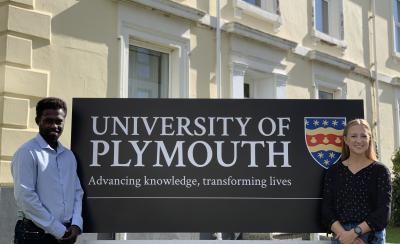United Kingdom News

Understanding the composition and distribution of faunal communities in potential mining areas is a crucial step in supporting environmental management of these areas.
PLYMOUTH, UK, 7 October 2020 - Two University of Plymouth PhD students have been researching the potential of one of the world’s biggest sources of critical metals lying on the seabed floor in the deep seas of the Pacific Ocean.
Wycliff Tupiti, from the Solomon Islands, and Kirsty McQuaid, from South Africa, have spent the last four years at the University on a fully-funded scholarship from Lockheed Martin subsidiary UK Seabed Resources, looking at the potential for harvesting polymetallic nodules. The pair recently submitted their final PhD research projects.
Polymetallic nodules are potato-sized rocks that lie in high concentrations on the sea floor 4 to 5 km deep in in the Clarion-Clipperton Zone, an area of the Pacific between Mexico and Hawai’i. The nodules contain high concentrations of metals including copper, nickel, manganese, molybdenum, cobalt and the rare earth metals. These metals have important applications in a wide range of industries – including battery and wind technologies, which are vital in the global energy transition from fossil fuels to low or zero carbon economy for a more sustainable planet. There is growing demand for these metals, but accessible supplies are diminishing on land. The nodules contain more critical nickel and cobalt than all the rest of the world’s reserves combined.
Wycliff Tupiti investigated the composition of nodules and the distribution of metals in the nodules themselves, which are used to understand nodule formation and their critical raw material potential. Kirsty McQuaid looked at predictive modelling as a way of classifying the habitats, which will help to assess the potential impact of seabed mining on the marine environment.
Their research is contributing to global efforts to deepen understanding of the commercial and environmental impact of harvesting polymetallic nodules in the deep seas, which is being led by regulatory body The International Seabed Authority (ISA).
Kirsty’s PhD was supervised by academics from the University’s School of Biological and Marine Sciences and Marine Institute. She said: ‘Understanding the composition and distribution of faunal communities in potential mining areas is a crucial step in supporting environmental management of these areas, and I am pleased to have contributed towards this body of knowledge. Participating in this PhD programme has provided opportunities not only for my personal development but also for participation of South African marine scientists in the activities of the ISA.’
Through his PhD, Wycliff worked alongside researchers with expertise in rare earth metals in the School of Geography, Earth and Environmental Sciences.
He said: ‘Developing a better understanding of polymetallic nodules is important as these deposits could potentially add to the future global supply of some valuable metals. At the same time they also provide us with useful insights to understanding earth processes particularly in the deep seas. The PhD training helped me in acquiring invaluable skills, knowledge and experience, and I am happy be involved in contributing knowledge to our understanding in this area. Therefore, I am grateful to UK Seabed Resources and the University of Plymouth for making this possible, as well as to the ISA and its efforts for capacity building in developing countries.’
UK Seabed Resources is a wholly-owned subsidiary of Lockheed Martin, a global aerospace and technology company, that holds exploration licences from UK Government to research in the Clarion-Clipperton Zone. The company is working with a team of world-leading scientists to build knowledge and understanding of the abyssal environment. Three research cruises have been undertaken, with the latest in February 2020. The cruises have involved:
-
84 days of exploration with world-leading scientists
-
Surveying more than 66,000 sq kms of abyssal terrain (at a depth of 4km below the ocean surface)
-
Mapping, in high resolution, using submersible AUVs (autonomous underwater vehicles), in excess of 235 sq kms of seabed
Both Kirsty and Wycliff have joined expeditions in the Clarion-Clipperton Zone to support their PhD work, Wycliff on a UK Seabed Resources cruise in February 2020 and Kirsty on a partner organisation’s cruise in 2018.
Chris Williams, Managing Director of UK Seabed Resources, said: ‘Sponsoring Kirsty and Wycliff through their PhDs is part of our commitment to further the science related to polymetallic nodules and to support world-class scientists from developing nations. We are delighted at the contribution they have made to global research efforts, and wish them all the best in their future studies. We would also like to thank the University and PhD supervisors for their exceptional support and professionalism.’
More about UK Seabed Resources
Media Contact: Liz Crawshaw, 07778 469658, liz.crawshaw@lmco.com

